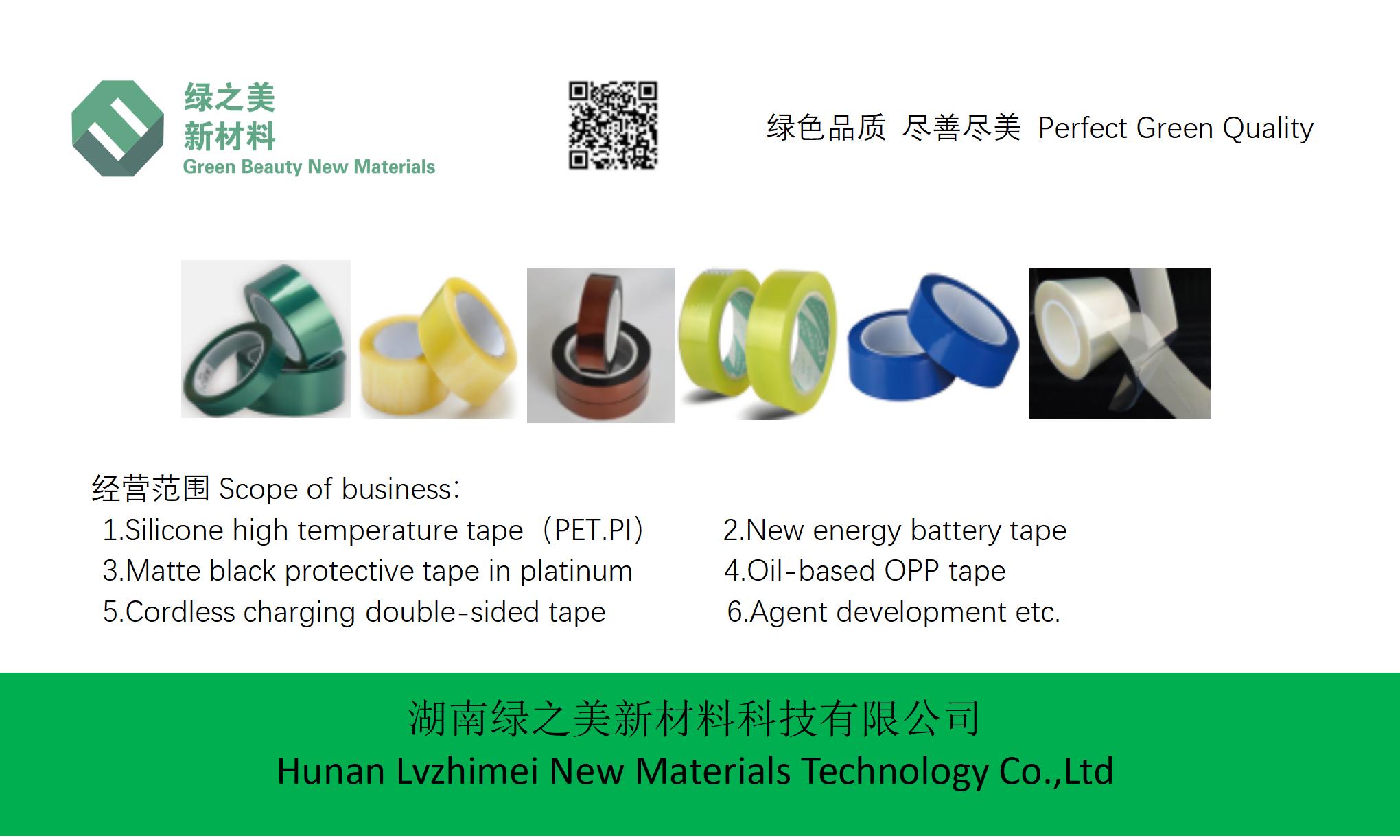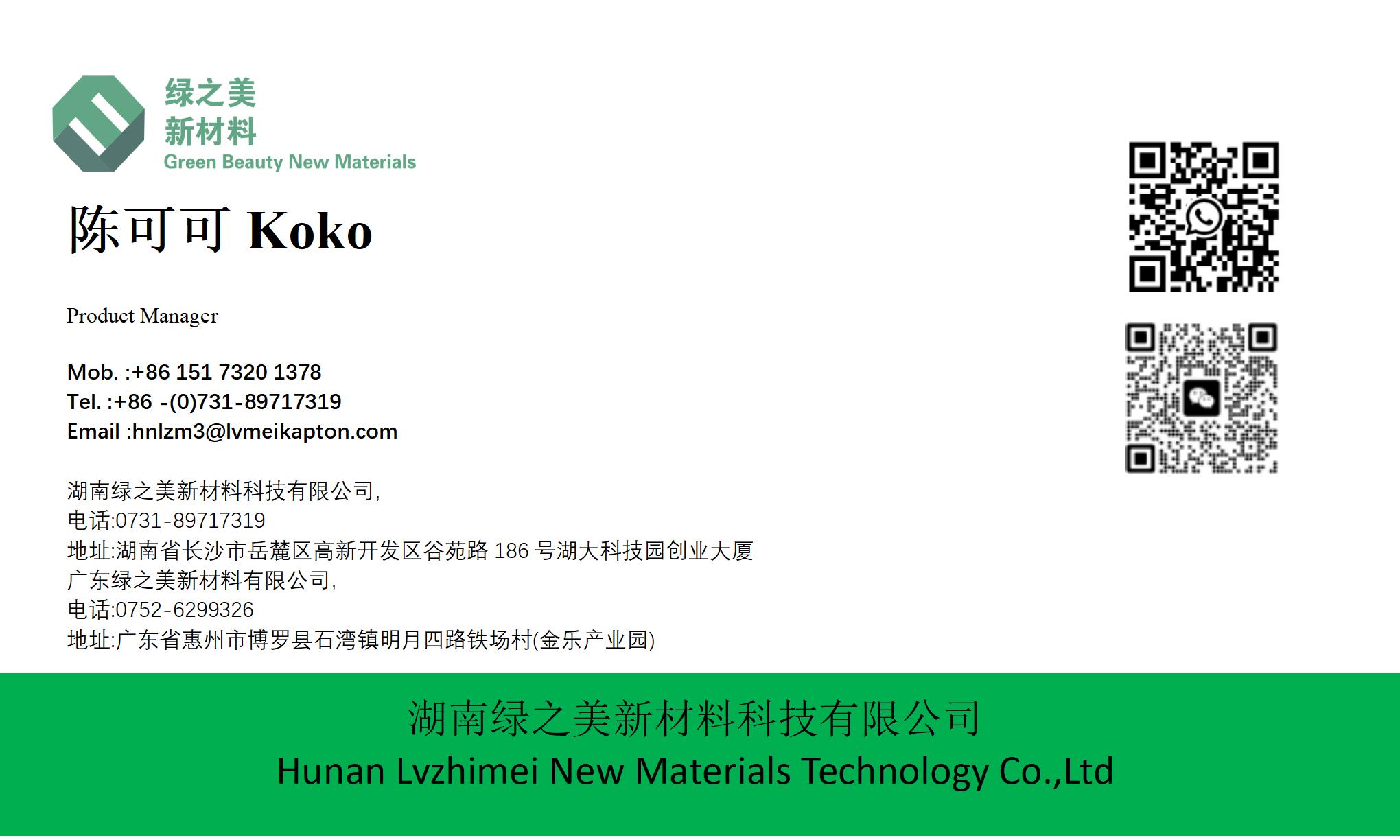hnlzm@lvmeikapton.com
+86 13787123465


Hunan Lvzhimei New Material Technology Co., Ltd.


NameDescriptionContent
What Makes LVMEIKAPTON Insulating Electrical Tape Superior to Adhesive PET Material High Temperature Tape? |https://www.lvmeikapton.com/
Source:
|
Author:Koko Chan
|
Published time: 2025-04-17
|
78 Views
|
Share:
This article explores the distinct advantages of LVMEIKAPTON Insulating Electrical Tape over Adhesive PET Material High Temperature Tape. By comparing their electrical insulation performance, temperature resistance, chemical resistance, and mechanical properties, it becomes evident why LVMEIKAPTON tape is the preferred choice in various high - demand applications, especially in the electronics and automotive industries.
.
1. Introduction
In the realm of insulating materials for electrical applications, the choice between different tapes can significantly impact the performance, reliability, and longevity of the end - product. LVMEIKAPTON Insulating Electrical Tape and Adhesive PET Material High Temperature Tape are two commonly used options, but they vary greatly in their properties and capabilities. Understanding these differences is crucial for manufacturers and engineers seeking to optimize their designs and ensure the safety and efficiency of their electrical systems.
2. Electrical Insulation Performance
2.1 Dielectric Strength
One of the most critical aspects of an insulating electrical tape is its dielectric strength, which measures its ability to withstand an applied voltage without breaking down. LVMEIKAPTON Insulating Electrical Tape exhibits an outstanding dielectric strength, typically ranging from 10 - 12 kV/mm. This high value ensures reliable insulation even in high - voltage environments. For instance, in power electronics applications where voltages can reach several hundred volts, LVMEIKAPTON tape effectively prevents electrical leakage and short - circuits.
In contrast, Adhesive PET Material High Temperature Tape has a relatively lower dielectric strength, usually around 5 - 8 kV/mm. This makes it less suitable for applications that demand high - voltage insulation. In situations where electrical components are operating at elevated voltages, the use of Adhesive PET Material High Temperature Tape may increase the risk of electrical failures and pose a safety hazard.
2.2 Volume Resistivity
Volume resistivity is another important parameter that indicates how well a material resists the flow of electric current through its volume. LVMEIKAPTON Insulating Electrical Tape boasts a high volume resistivity, on the order of 10¹⁴ - 10¹⁵ Ω·cm. This property helps to maintain the integrity of the electrical insulation over time, reducing the likelihood of current leakage and ensuring stable electrical performance.
Adhesive PET Material High Temperature Tape, however, has a lower volume resistivity, approximately 10¹² - 10¹³ Ω·cm. The lower resistivity means that it is more prone to allowing small amounts of current to pass through, which can lead to energy losses and potential malfunctions in sensitive electrical devices.
3. Temperature Resistance
3.1 Continuous Operating Temperature
LVMEIKAPTON Insulating Electrical Tape can operate continuously at high temperatures. It can withstand temperatures up to 260°C for 30 minutes, with excellent instantaneous temperature resistance as well. This high - temperature tolerance makes it suitable for applications in environments where heat is a significant factor, such as in automotive engines, industrial ovens, and high - power electronic devices.
Adhesive PET Material High Temperature Tape, on the other hand, has a lower continuous operating temperature limit. It typically starts to degrade and lose its adhesive properties at temperatures around 180 - 200°C. In applications where sustained high temperatures are present, using Adhesive PET Material High Temperature Tape may result in tape failure, such as delamination or loss of insulation effectiveness.
3.2 Thermal Cycling Performance
In addition to continuous operating temperature, thermal cycling performance is also crucial, especially in applications where the temperature fluctuates frequently. LVMEIKAPTON Insulating Electrical Tape can endure repeated thermal cycles between - 40°C and 300°C without significant degradation. Its stable performance under thermal cycling ensures long - term reliability in various industrial and automotive applications.
Adhesive PET Material High Temperature Tape struggles to maintain its properties during thermal cycling. The repeated expansion and contraction caused by temperature changes can lead to adhesive failure, cracking, and a decrease in insulation performance. This makes it less reliable for applications that experience significant temperature variations.
4. Chemical Resistance
4.1 Resistance to Common Solvents
LVMEIKAPTON Insulating Electrical Tape has strong tolerance to common organic solvents such as alcohol and acetone. When in contact with these chemicals, its performance remains stable, and it does not experience swelling, softening, or degradation of its adhesive properties. This chemical resistance is particularly important in industries where electrical components may be exposed to cleaning agents or solvents during manufacturing or maintenance processes.
Adhesive PET Material High Temperature Tape, however, is more vulnerable to chemical attack. Exposure to certain solvents can cause it to swell or lose its adhesion, which can compromise the integrity of the electrical insulation. In applications where chemical exposure is likely, using Adhesive PET Material High Temperature Tape may lead to premature tape failure and potential electrical problems.
4.2 Resistance to Battery Electrolytes
In the automotive and electronics industries, especially in battery - related applications, resistance to battery electrolytes is crucial. LVMEIKAPTON Insulating Electrical Tape can withstand the corrosive effects of battery electrolytes, maintaining its insulation and adhesive properties. This makes it an ideal choice for insulating battery components and preventing short - circuits caused by electrolyte leakage.
Adhesive PET Material High Temperature Tape has limited resistance to battery electrolytes. The chemicals in the electrolyte can react with the tape, leading to degradation and a loss of its insulating capabilities. In battery applications, this can be a significant drawback, as it may increase the risk of battery failure and safety hazards.
5. Mechanical Properties
5.1 Tensile Strength
LVMEIKAPTON Insulating Electrical Tape exhibits high tensile strength, typically around 200 MPa. This high strength allows it to withstand mechanical stress without breaking or tearing, ensuring that it can effectively hold components in place and maintain its insulation function even in vibrating or high - stress environments.
Adhesive PET Material High Temperature Tape has a relatively lower tensile strength, usually around 60 - 80 MPa. In applications where mechanical stress is present, such as in automotive wiring harnesses or industrial machinery, Adhesive PET Material High Temperature Tape may be more likely to break or become damaged, compromising the electrical insulation and potentially causing electrical failures.
5.2 Peel Strength
The peel strength of a tape indicates how well it adheres to a surface and resists being peeled off. LVMEIKAPTON Insulating Electrical Tape has excellent peel strength, with values around 4 - 5 N/cm on various substrates. This strong adhesion ensures that the tape remains firmly attached to the components it is insulating, even in harsh environmental conditions.
Adhesive PET Material High Temperature Tape has a lower peel strength, typically in the range of 2 - 3 N/cm. In applications where a secure bond is required, such as in electronic device assembly or electrical insulation in high - vibration environments, the lower peel strength of Adhesive PET Material High Temperature Tape may lead to tape detachment, which can result in insulation failure.
6. Cost - Benefit Analysis
Although LVMEIKAPTON Insulating Electrical Tape may have a higher upfront cost compared to Adhesive PET Material High Temperature Tape, its superior performance leads to significant long - term savings. In applications where reliability and long - term performance are crucial, the lower failure rate and longer lifespan of LVMEIKAPTON tape result in reduced maintenance costs, fewer product recalls, and improved overall product quality. For example, in the automotive industry, the use of LVMEIKAPTON tape in electrical systems can lead to a decrease in warranty claims due to electrical failures, ultimately saving manufacturers money in the long run.
7. Applications
7.1 Electronics Industry
In the electronics industry, LVMEIKAPTON Insulating Electrical Tape is widely used in high - end electronic devices such as smartphones, laptops, and servers. Its high dielectric strength, excellent temperature resistance, and chemical stability make it ideal for insulating sensitive electronic components and ensuring reliable electrical performance. In contrast, Adhesive PET Material High Temperature Tape may be used in less demanding applications where cost is a primary concern, but its limitations in electrical insulation and temperature resistance may limit its use in more critical components.
7.2 Automotive Industry
In the automotive industry, LVMEIKAPTON Insulating Electrical Tape is used in various applications, including engine bay wiring, battery insulation, and electrical component protection. The harsh environment in the engine bay, with high temperatures, vibrations, and exposure to chemicals, requires a tape with excellent performance in all aspects. Adhesive PET Material High Temperature Tape, due to its lower temperature and chemical resistance, is not suitable for many of these automotive applications, especially in areas where reliability is crucial for the safety and performance of the vehicle.
8. Conclusion
LVMEIKAPTON Insulating Electrical Tape clearly outperforms Adhesive PET Material High Temperature Tape in terms of electrical insulation performance, temperature resistance, chemical resistance, and mechanical properties. Its superior capabilities make it the preferred choice in a wide range of applications, particularly those that demand high - voltage insulation, high - temperature tolerance, and reliable performance in harsh environments. While Adhesive PET Material High Temperature Tape may have its place in some cost - sensitive applications, LVMEIKAPTON Insulating Electrical Tape offers a higher level of quality and reliability that is essential for many modern industrial and electronic applications. To learn more about the specific applications and benefits of LVMEIKAPTON Insulating Electrical Tape, you can download our detailed technical report available at [download link]. This report provides in - depth analysis and case studies for a comprehensive understanding.
.



Hunan Lvzhimei New Material Technology Co., Ltd.
Quick Links
Product Categories
© 2024 Hunan Lvzhimei New Material Technology Co., Ltd.All Rights Reserved. Designed by Erge
0731 - 89717319
hnlzm@lvmeikapton.com
+86 13787123465
Room 502, Chuangye Building, No186, Guyuan Road, High-Tech District, Changsha, Hunan, China
CONTACT



